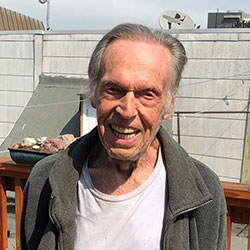Dedicated to Frugality, Charles Gresham Leaves Millions to Charity
Dedicated to Frugality, Charles Gresham Leaves Millions to Charity

Charles Gresham
Charles Gresham was an intriguing gentleman. In fact, most would call him eccentric. He prided himself on the fact that during his adult life, he never bought a new piece of clothing and wore what he found discarded by others. Charles walked everywhere he went in San Francisco—because it was better for the environment—and collected leftover food from restaurants. While most restaurant owners assumed by his clothing that the food was for him, Charles was actually distributing it to the area homeless population.
Charles was also the neighborhood gardener. Alleys that were too small for modern cars, he cultivated and turned into beautiful gardens—and he didn’t stop there.
“He would find a particularly dingy part of San Francisco, clean it up, put down fertilizer and plant discarded trees,” says Helen Milowe, JD, longtime attorney and friend. “He was once fined by the city for unauthorized planting of trees—a charge I was happy to help get thrown out.”
Charles has been described as the most kind-hearted and generous person. He could befriend anyone from a homeless person to a CEO and always wanted to help others. In fact, he welcomed a homeless man with medical problems into his 500-square-foot home and cared for him for 15 years.
While many knew Charles as altruistic, it would have surprised most of them to know that this man, who repurposed used items before recycling and upcycling were trends, was actually one of the wealthiest people they were to ever meet.
A Not-So-Humble Beginning
Charles came from a wealthy and political Texas family. Though much of the fortune was lost in the Great Depression, an aunt had married into the du Pont family and paid for Charles to go to college. After one year, he dropped out to become an artist and to garden. Wanting to make it on his own, Charles worked many odd jobs that would enable him to still enjoy his passions. He earned money herding sheep in New Mexico, working as a parking attendant at a Hollywood studio and working in the warehouse of a San Francisco auction house. Any money beyond what he needed for his humble existence, went straight into savings.
He had one showcase of his artwork and won a few awards early on. Charles eventually developed an essential tremor, causing his abstract realism to look more like a piece by Jackson Pollock, so he started assembling found objects into pieces of art.
“He liked to collect things that others had seen as trash, but to him were beauty and art,” says Helen.
To Charles, using found objects was more than an expression of art. It was a way of life. He had a passion for taking care of the earth and thought that if he could use discarded objects instead of buying new, his environmental footprint would be lighter.
“Charles was anti-materialistic,” says Joe Gillach, a close friend. “His home was full of treasures that he salvaged from the street. In his later years, he got by each day on a small pension and social security, so he didn’t have to tap into savings.”
A Profound Legacy for a Humble Man
Charles lived a long and happy 98 years, nearly 50 of which he spent with his beloved partner and fellow artist Sidney Engelberg.
According to Joe, Charles had some inheritance, but Sidney had long passed and there were no children. Charles never felt the money truly belonged to him, therefore he donated it—mostly to benefit nature, which he viewed as his heir. He left a large portion of his money to land trusts and another portion to National Jewish Health through a substantial legacy gift and several charitable gift annuities, from which he received income during his life.
“Charles was quite savvy about investing,” Joe says. “He was a testament that even a small amount of money, invested properly, can turn into a lifetime of savings. Charles had a financial plan that included smart investing and frugal living in order to leave as much money to charity as he possibly could.”
In the end, Charles attained his lifelong goal of leaving the world a better place than he found it and donating millions to the charities he loved.
You, too, can be an inspiration for giving like Charles Gresham. Contact Gordon P. Smith, MBA, CFRE at smithgo@njhealth.org or 1.800.423.8891, Ext. 6549 to learn about using your estate plan to make a meaningful gift to National Jewish Health.
Information contained herein was accurate at the time of posting. The information on this website is not intended as legal or tax advice. For such advice, please consult an attorney or tax advisor. Figures cited in any examples are for illustrative purposes only. References to tax rates include federal taxes only and are subject to change. State law may further impact your individual results. California residents: Annuities are subject to regulation by the State of California. Payments under such agreements, however, are not protected or otherwise guaranteed by any government agency or the California Life and Health Insurance Guarantee Association. Oklahoma residents: A charitable gift annuity is not regulated by the Oklahoma Insurance Department and is not protected by a guaranty association affiliated with the Oklahoma Insurance Department. South Dakota residents: Charitable gift annuities are not regulated by and are not under the jurisdiction of the South Dakota Division of Insurance.